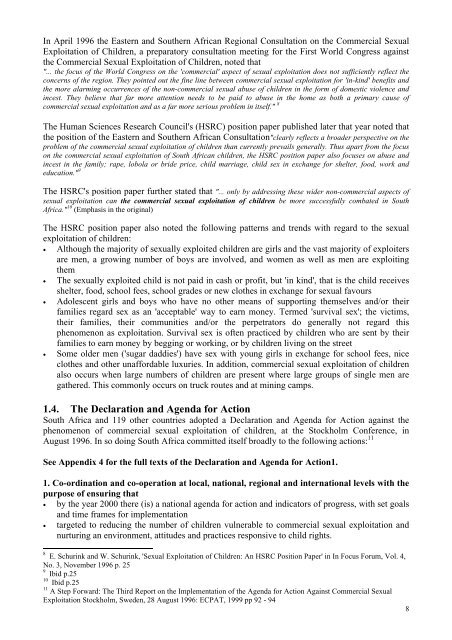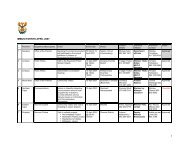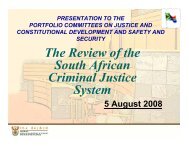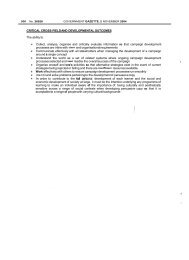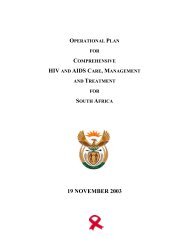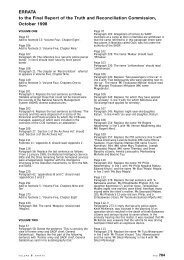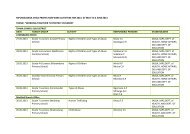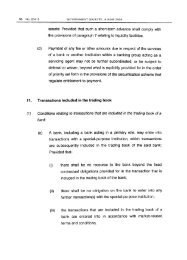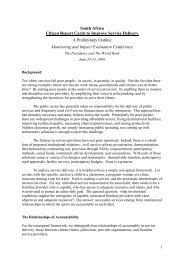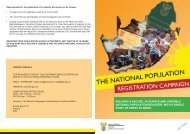The trafficking of children for purposes of sexual exploitation
The trafficking of children for purposes of sexual exploitation
The trafficking of children for purposes of sexual exploitation
Create successful ePaper yourself
Turn your PDF publications into a flip-book with our unique Google optimized e-Paper software.
In April 1996 the Eastern and Southern African Regional Consultation on the Commercial Sexual<br />
Exploitation <strong>of</strong> Children, a preparatory consultation meeting <strong>for</strong> the First World Congress against<br />
the Commercial Sexual Exploitation <strong>of</strong> Children, noted that<br />
"... the focus <strong>of</strong> the World Congress on the 'commercial' aspect <strong>of</strong> <strong>sexual</strong> <strong>exploitation</strong> does not sufficiently reflect the<br />
concerns <strong>of</strong> the region. <strong>The</strong>y pointed out the fine line between commercial <strong>sexual</strong> <strong>exploitation</strong> <strong>for</strong> 'in-kind' benefits and<br />
the more alarming occurrences <strong>of</strong> the non-commercial <strong>sexual</strong> abuse <strong>of</strong> <strong>children</strong> in the <strong>for</strong>m <strong>of</strong> domestic violence and<br />
incest. <strong>The</strong>y believe that far more attention needs to be paid to abuse in the home as both a primary cause <strong>of</strong><br />
commercial <strong>sexual</strong> <strong>exploitation</strong> and as a far more serious problem in itself." 8<br />
<strong>The</strong> Human Sciences Research Council's (HSRC) position paper published later that year noted that<br />
the position <strong>of</strong> the Eastern and Southern African Consultation"clearly reflects a broader perspective on the<br />
problem <strong>of</strong> the commercial <strong>sexual</strong> <strong>exploitation</strong> <strong>of</strong> <strong>children</strong> than currently prevails generally. Thus apart from the focus<br />
on the commercial <strong>sexual</strong> <strong>exploitation</strong> <strong>of</strong> South African <strong>children</strong>, the HSRC position paper also focuses on abuse and<br />
incest in the family; rape, lobola or bride price, child marriage, child sex in exchange <strong>for</strong> shelter, food, work and<br />
education." 9<br />
<strong>The</strong> HSRC's position paper further stated that "... only by addressing these wider non-commercial aspects <strong>of</strong><br />
<strong>sexual</strong> <strong>exploitation</strong> can the commercial <strong>sexual</strong> <strong>exploitation</strong> <strong>of</strong> <strong>children</strong> be more successfully combated in South<br />
Africa." 10 (Emphasis in the original)<br />
<strong>The</strong> HSRC position paper also noted the following patterns and trends with regard to the <strong>sexual</strong><br />
<strong>exploitation</strong> <strong>of</strong> <strong>children</strong>:<br />
• Although the majority <strong>of</strong> <strong>sexual</strong>ly exploited <strong>children</strong> are girls and the vast majority <strong>of</strong> exploiters<br />
are men, a growing number <strong>of</strong> boys are involved, and women as well as men are exploiting<br />
them<br />
• <strong>The</strong> <strong>sexual</strong>ly exploited child is not paid in cash or pr<strong>of</strong>it, but 'in kind', that is the child receives<br />
shelter, food, school fees, school grades or new clothes in exchange <strong>for</strong> <strong>sexual</strong> favours<br />
• Adolescent girls and boys who have no other means <strong>of</strong> supporting themselves and/or their<br />
families regard sex as an 'acceptable' way to earn money. Termed 'survival sex'; the victims,<br />
their families, their communities and/or the perpetrators do generally not regard this<br />
phenomenon as <strong>exploitation</strong>. Survival sex is <strong>of</strong>ten practiced by <strong>children</strong> who are sent by their<br />
families to earn money by begging or working, or by <strong>children</strong> living on the street<br />
• Some older men ('sugar daddies') have sex with young girls in exchange <strong>for</strong> school fees, nice<br />
clothes and other unaf<strong>for</strong>dable luxuries. In addition, commercial <strong>sexual</strong> <strong>exploitation</strong> <strong>of</strong> <strong>children</strong><br />
also occurs when large numbers <strong>of</strong> <strong>children</strong> are present where large groups <strong>of</strong> single men are<br />
gathered. This commonly occurs on truck routes and at mining camps.<br />
1.4. <strong>The</strong> Declaration and Agenda <strong>for</strong> Action<br />
South Africa and 119 other countries adopted a Declaration and Agenda <strong>for</strong> Action against the<br />
phenomenon <strong>of</strong> commercial <strong>sexual</strong> <strong>exploitation</strong> <strong>of</strong> <strong>children</strong>, at the Stockholm Conference, in<br />
August 1996. In so doing South Africa committed itself broadly to the following actions: 11<br />
See Appendix 4 <strong>for</strong> the full texts <strong>of</strong> the Declaration and Agenda <strong>for</strong> Action1.<br />
1. Co-ordination and co-operation at local, national, regional and international levels with the<br />
purpose <strong>of</strong> ensuring that<br />
• by the year 2000 there (is) a national agenda <strong>for</strong> action and indicators <strong>of</strong> progress, with set goals<br />
and time frames <strong>for</strong> implementation<br />
• targeted to reducing the number <strong>of</strong> <strong>children</strong> vulnerable to commercial <strong>sexual</strong> <strong>exploitation</strong> and<br />
nurturing an environment, attitudes and practices responsive to child rights.<br />
8 E. Schurink and W. Schurink, 'Sexual Exploitation <strong>of</strong> Children: An HSRC Position Paper' in In Focus Forum, Vol. 4,<br />
No. 3, November 1996 p. 25<br />
9 Ibid p.25<br />
10 Ibid p.25<br />
11 A Step Forward: <strong>The</strong> Third Report on the Implementation <strong>of</strong> the Agenda <strong>for</strong> Action Against Commercial Sexual<br />
Exploitation Stockholm, Sweden, 28 August 1996: ECPAT, 1999 pp 92 - 94<br />
8


